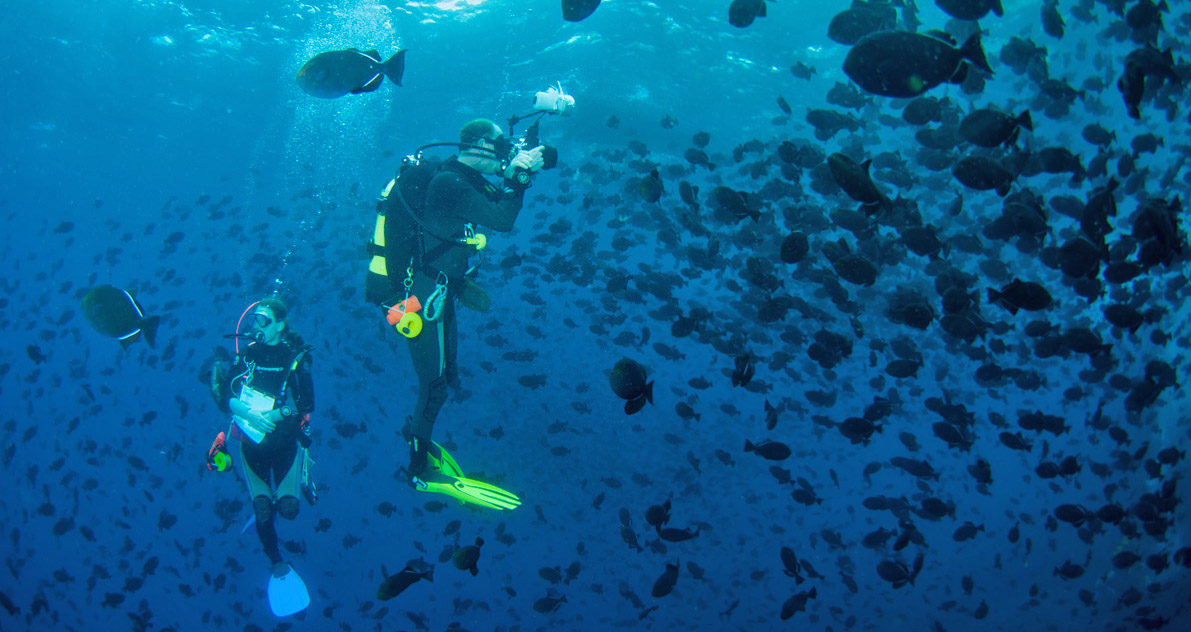A new study featuring contributions from British Antarctic Survey (BAS) scientists has predicted the top emerging threats to ocean biodiversity over the coming decades.
The study, which is published today in the journal Nature Ecology and Evolution, was conducted by an international team of experts, which included BAS biologist and science leader, Professor Lloyd Peck. It lists 15 issues which are likely to have a significant impact on marine and coastal biodiversity over the next five to ten years. These include:
- the impacts of wildfires on coastal ecosystems
- the effects of new biodegradable materials on the marine environment
- an ‘empty’ zone at the equator as species move away from this warming region of the ocean.
These issues were identified using a ‘horizon scanning’ technique which focussed on identifying potential threats which are not currently receiving widespread attention, but are likely to become important over the next decade. The aim of the study is to raise awareness and encourage investment into the full assessment of these issues now, and potentially drive policy change, before the issues have a major impact on biodiversity.
Professor Lloyd Peck, BAS biologist and science leader in Biodiversity Adaptation says:
“Horizon scanning tries to identify problems or solutions to problems that are not currently in common knowledge and to point a spotlight on them to allow us to respond earlier. This Marine and coastal Horizon scan does just that and identifies 15 such issues, including increase in the trade of fish swim bladders and increased exploitation of marine collagens that are not currently on many people’s radar.
It also highlights potential problems with new biodegradable products and some studies have already demonstrated that there are natural fibres used in some clothing that are more toxic than plastic fibres. We clearly need to be careful in how we transition to a more biodiversity friendly way of living and working and research such as this is helping point the way.”
The horizon scan involved 30 experts in marine and coastal systems from 11 countries in the global north and south, from a variety of backgrounds including scientists and policy-makers.

Several of the issues identified are linked to exploitation of ocean resources. For example, deep sea ‘brine pools’ are unique marine environments home to a diversity of life – and have high concentrations of salts containing lithium. The authors warn that rising demand for lithium for electric vehicle batteries may put these environments at risk. They call for rules to ensure biodiversity is assessed before deep sea brine pools are exploited.
While overfishing is an immediate problem, the horizon scan looked beyond this to what might happen next. The authors think there may soon be a move to fishing in the deeper waters of the mesopelagic zone (a depth of 30m – 100m), where fish are not fit for human consumption but can be sold as food to fish farms.
Dr Ann Thornton, conservation biologist at the University of Cambridge’s Department of Zoology and joint first author on the paper says:
“There are areas where we believe immediate changes could prevent huge problems arising over the next decade, such as overfishing in the ocean’s mesopelagic zone. Curbing this would not only stop overexploitation of these fish stocks, but reduce the disruption of carbon cycling in the ocean – because these species are an ocean pump that removes carbon from our atmosphere.”
Not all of the predicted impacts are negative. The authors think the development of new technologies, such as soft robotics and better underwater tracking systems, will enable scientists to learn more about marine species and their distribution. This, in turn, will guide the development of more effective marine protected areas. But they also warn that the impacts of these technologies on biodiversity must be assessed before they are deployed at scale.
The United Nations has designated 2021-2030 as the ‘UN Decade of Ocean Science for Sustainable Development.’ In addition, the fifteenth Conference of the Parties (COP) to the United Nations Convention on Biological Diversity will conclude negotiations on a global biodiversity framework in late 2022. The aim is to slow and reverse the loss of biodiversity, and establish goals for positive outcomes by 2050.
The research was funded by Oceankind.
The full study, A global horizon scan of issues impacting marine and coastal biodiversity conservation by Herbert-Read, J.E. et al., is published in Nature Ecology and Evolution.
